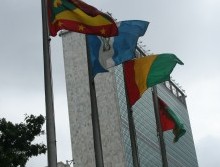 After an initial decrease in violence in Syria after a ceasefire went into effect last Thursday, renewed conflict has raised concerns as a United Nations observer mission is being discussed. UN Secretary-General Ban Ki-moon said in a letter to the Security Council that he recommended sending a team of up to 300 unarmed military UN observers and civilian experts into Syria to oversee the situation.
After an initial decrease in violence in Syria after a ceasefire went into effect last Thursday, renewed conflict has raised concerns as a United Nations observer mission is being discussed. UN Secretary-General Ban Ki-moon said in a letter to the Security Council that he recommended sending a team of up to 300 unarmed military UN observers and civilian experts into Syria to oversee the situation.
The United States, meanwhile, expressed concern about whether the Syrian regime would allow the mission to do its job, according to US Ambassador to the UN Susan Rice.
Rice, in comments to the press released by her office, quoted Ban’s letter, which noted that while the violence apparently “dropped markedly” after April 12, “violent incidents and reports of casualties have escalated again in recent days, with reports of shelling of civilian areas and abuses by government forces.” Ban further noted that the government has reported “violent actions by armed groups.”
Said Ban in his letter, “The cessation of armed violence in all its forms is therefore clearly incomplete.”
Rice, speaking on Thursday in her role as US ambassador, said the Bashar al-Assad government in the last six days has unleashed “yet another wave of horrific violence against the Syrian people.” She also accused the regime of restricting the movement of the few advance UN monitors currently there.
She called upon Assad to allow the UN team into cities such as Homs, which has been among the hardest hit by the government. Further, she said shelling of cities had to cease and troops and heavy weapons had to be pulled back from population centers. “The government could easily do all of these things today,” said Rice.
The Assad regime’s crackdown on the opposition in Syria has killed thousands of civilians. In addition, what began as a peaceful protest opposition movement has become more militant, with outsiders concerned a civil war could erupt in the country.
Rice almost hedged on whether the US would ultimately approve authorizing a larger UN observer team if things don’t change, seeing as the Syrian authorities have yet to meet the demands of the Security Council outlined as necessary for such monitors to be successful.
“We, like every other member state, will consider very carefully the Secretary-General’s recommendations” suggesting more monitors, said Rice. “But what I’m saying is, that in the US view, the onus remains on the Syrian authorities to demonstrate that it will allow these monitors to do their job, and that’s why the role of the advance team is so important.
“We could authorize—theoretically, the Council could authorize tomorrow the full complement of observers, but if they are not able to move freely, if they’re not able to visit the hot spots, if their freedom is hindered then they won’t be effective. And obviously we all have a shared interest in any monitoring mission being effective.”
At this point, despite the ongoing violence, Rice was not prepared to declare the ceasefire plan a failure.
“We and other members of the international community have supported it because we believe it offers the best and perhaps the last best opportunity for this conflict to be resolved through diplomatic means, as opposed to military means. And we think that that’s very important,” said Rice.
“Obviously, it is still uncertain whether that plan will succeed… We all remain interested in maximizing the possibility of this conflict being resolved peacefully. And if we assess that the addition of monitors in the current context will help advance that or at least advance the prospects for it, then that will be an important factor in our decision making.”
(By Joshua Spurlock, www.themideastupdate.com, April 19, 2012)
